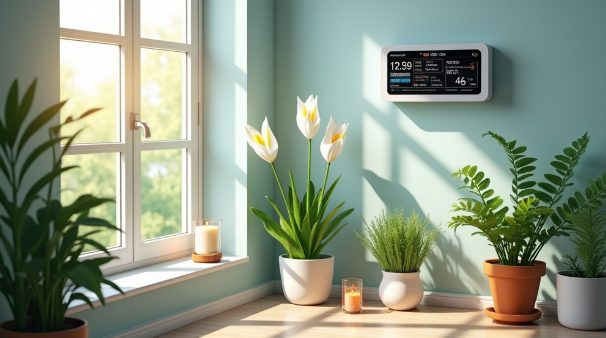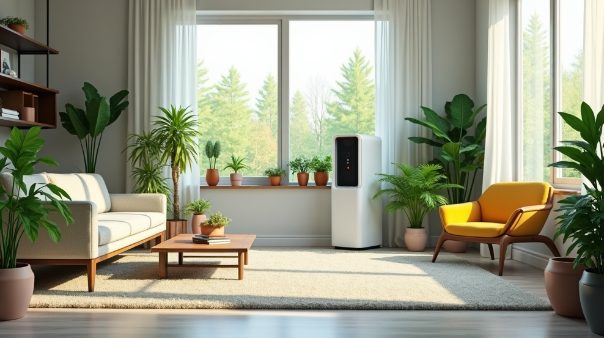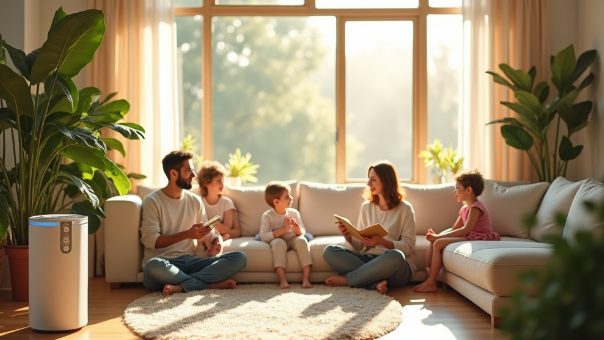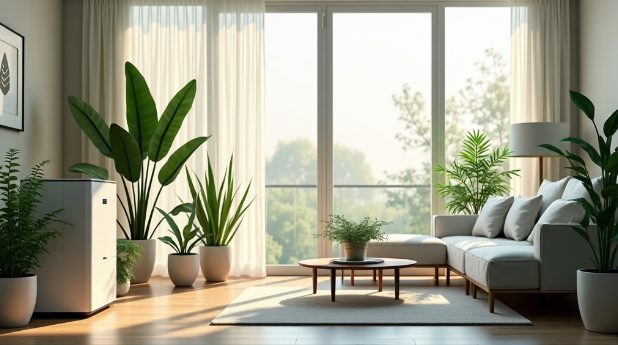Indoor Air Quality Improvement is key for a healthy home or office. It affects how well you breathe and feel every day. Clean air helps you stay focused and can even keep you from getting sick. If you want to make your indoor air better, there are easy steps to take.
Table of Contents
Key Takeaways
- Indoor air quality is important to your health and comfort.
- Ventilation helps bring fresh air in and push stale air out.
- Using air purifiers can remove dust and allergens.
- Regular cleaning of surfaces and changing filters is essential.
- Houseplants can help clean the air naturally.
- Keeping humidity levels balanced helps prevent mold growth.
For more detailed information on maintaining a clean environment, consider exploring our comprehensive guide on effective cleaning methods.
Understanding Indoor Air Quality Improvement

Indoor Air Quality Improvement refers to the air inside buildings. This includes homes, schools, and offices. Poor air quality can come from many sources. These include dust, mold, smoke, and chemicals from cleaning products.
In Minneapolis, winter can make it hard to keep air fresh. You may rely on heating systems that can trap dust and allergens. This is why it is important to work on improving your indoor air quality.
Why Is Indoor Air Quality Important?
Good indoor air quality matters for your health. Breathing in clean air can lead to better focus and energy. It can also lower the risk of getting sick. Poor indoor air can cause allergies, headaches, and fatigue. It can even make asthma worse.
Signs of Poor Indoor Air Quality
Look out for these signs that your indoor air quality might be poor:
- Frequent coughing or sneezing.
- Dust collects on surfaces quickly.
- Strange odors in the air.
- Dizziness or headaches.
- Increased allergy symptoms.
If you notice these issues, it’s time to take action.
Steps to Indoor Air Quality Improvement

There are simple steps you can take to enhance the air in your space. Here Indoor Air Quality Improvement are effective ways to get started:
1. Improve Ventilation
Ventilation means letting fresh air in while pushing stale air out. You can do this by opening windows and doors when the weather allows.
In the winter, it can be tough to open windows. Instead, consider using exhaust fans in bathrooms and kitchens. These fans help remove moisture and odors.
2. Use Air Purifiers
Air purifiers can help remove dust, pollen, and smoke particles from the air. Look for models with HEPA filters. These filters can trap tiny particles that can harm your health. Place air purifiers in key areas like bedrooms and living rooms.
3. Change Filters Regularly
Heating and cooling systems have filters that need changing. These filters can fill up with dust, making it hard for your system to work. Change your filters every three months, or more often if you have pets.
4. Keep Surfaces Clean
Cleaning your home or office regularly helps reduce dust and allergens. Use a damp cloth to wipe surfaces, as this traps dust instead of spreading it around.
Vacuum carpets and rugs weekly. Make sure your vacuum has a HEPA filter to catch small particles. If you have hard floors, sweep and mop often.
5. Manage Humidity Levels
Humidity refers to the moisture in the air. Too much moisture can lead to mold growth, while too little can cause dry skin and respiratory issues. Aim to keep humidity levels between 30% and 50%.
You can use a dehumidifier if you live in a humid area. If your home is too dry, consider a humidifier.
6. Add Houseplants
Some houseplants can help clean the air. Plants like spider plants, peace lilies, and snake plants can absorb toxins. They also add beauty to your space. Just be sure to care for them properly.
7. Avoid Smoking Indoors
If you or someone in your home smokes, consider doing it outside. Smoke can linger in the air and stick to surfaces, making indoor air unhealthy.
8. Use Natural Cleaning Products
Many cleaning products have harsh chemicals that can pollute your indoor air. Look for natural or eco-friendly options instead. You can also make your cleaners using vinegar and baking soda.
9. Keep Windows and Doors Sealed
Check for drafts and seal any gaps in windows and doors. This keeps outdoor air from coming in and helps your heating or cooling system work better.
10. Test Indoor Air Quality
If you are concerned about your indoor air quality, consider testing it. There are kits available that can measure levels of pollutants. You can also hire professionals to assess your air quality and recommend improvements.
| Common Indoor Air Pollutants | Sources | Health Effects |
|---|---|---|
| Dust | Carpets, furniture | Allergies, respiratory issues |
| Mold | Damp areas, leaks | Allergies, asthma exacerbation |
| VOCs (Volatile Organic Compounds) | Paints, cleaners, furnishings | Headaches, dizziness, long-term health issues |
| Pollen | Plants, outdoor air | Allergies, respiratory discomfort |
Benefits of Indoor Air Quality Improvement

When you work on your Indoor Air Quality Improvement, you gain several benefits:
- Better health: Clean air helps reduce the risk of respiratory problems and allergies.
- Improved focus: Fresh air can make it easier to concentrate.
- More energy: Clean air can help you feel more awake and active.
- Reduced odors: Fresh air helps eliminate musty smells.
- Comfortable environment: A clean and fresh space is more inviting.
Additional Tips for Maintaining Indoor Air Quality Improvement
- Regularly check and replace HVAC filters.
- Ensure proper drainage around your home to prevent moisture buildup.
- Utilize exhaust fans when cooking to minimize smoke and odors.
- Use moisture-absorbing materials in basements and crawl spaces.
If cleaning is not enough, consider reaching out for professional assistance to ensure a comprehensive approach to a healthier Indoor air quality improvement. Our team specializes in deep cleaning services that target hidden pollutants.
Getting Professional Help

Sometimes, you may need expert help to improve your indoor air quality. Professionals can deep clean spaces and check for hidden issues. For example, mold can grow in places you can’t see. A cleaning service can help you deal with this issue.
At Health Point Cleaning Solutions, we provide commercial and medical cleaning services. Our team uses professional-grade products to ensure your space is not only clean but safe.
We offer a free initial detail cleaning with a regular service plan. This way, you can see the difference we make in your indoor air quality.
Conclusion
Improving indoor air quality is important for a healthy life. By taking simple steps, you can enjoy cleaner air at home or work. Remember to open windows, use air purifiers, and keep your space clean.
If you ever feel overwhelmed, don’t hesitate to contact a cleaning service. They can provide professional help and give you peace of mind.
For any cleaning needs in the Minneapolis area, reach out to Health Point Cleaning Solutions today. We are here to help you breathe easier in your space.
Maintaining good indoor air quality is not just a task; it is an investment in your health and well-being. Start today, and notice the difference clean air can make in your life.
Transform your home with our comprehensive guide to indoor air quality improvement. Learn how to ensure a safe and healthy atmosphere for all. Feel free to visit our website or contact us for assistance.

